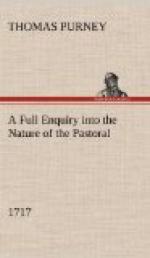Yet is Pastoral by no means ty’d down by nature to the Length used by Theocritus and all his Followers. ’Tis only Example has introduc’d that Method. For, ’tis a Poem capable of raising two Passions, and those tho’ all consistent with one another, yet what raise Pleasures, the most widely different of any, in the Mind. When we have tir’d the Reader with a mournful and pitious Scene, we may relieve and divert his Mind with agreeable and joyous Images. And these the Poet may diversify and vary as often as he pleases. And so different are the Passions of Pity and Joy, that he may all thro’ the Poem please in an equal Degree, yet all thro’ the Poem in a different Manner.
Besides, this Poem changes the general Scene, which is more than even Tragedy does. A Poet who has form’d a perfect Notion of the Beautiful, and furnished his Mind with a sufficient number of delightful Images, before he set’s down to write a Pastoral, will lead the Reader thro’ so sweet a Variety of amusing scenes, and show so many beautiful Pictures to his Imagination, that he will never think the tenth Part of a Tragedy’s Length too much for a Pastoral.
’Tis true indeed that they who make a Pastoral no more considerable than a Song or Ballad (as Theocritus, Virgil, &c.) without Passions, Characters, a delightful Fable, or any Moral, do well to make it of no greater Extent than a Song or Ballad. Where there is nought to delight but the Sentiments, (for they aim at neither the soft nor the sublime Language) a Reader cannot attend to more than a hundred Lines; but where the Mind is engag’d and concern’d for the Issue of the Story, and eager to know the Event, ’tis insensibly drawn on, and haveing some Aim in View, is much less weary’d, tho’ led on to a greater Extent.
CHAP. III.
That the Pastoral Action must not be very little and minute; also that several Under-actions must run thro’ the Poem.
A Third Quality, laid down as necessary to constitute a Fable wholly perfect, was this, That as there must be but one Action, that Action may not be any trifling, silly Circumstance of a Shepherd’s Life. As one Swain’s telling the other how poor and bare he is grown. Or one complaining to the other, that his Flock has had some Mischance, or the like; which is as much as can be gather’d out of the Pastorals form’d after the ordinary Way. For if you take the Actions of any of ’em, divested of the Ornaments of Poetry, and the constant Repetition of the pleasing Words, Grove, Breeze, Mead, &c. you will find nothing, even nothing at all in any of ’em.
So that, tho’ these Pastorals mostly may have Actions, nay, and Unity of Action; yet are they Actions no more proper for a Poem, than a Proposition of Euclid, turn’d into Verse, would be. There is nothing, (not even the telling how the Sow and Pigs swallow’d their Wash, and fought the while,) but might be call’d one Action, with a Beginning, Middle and End. So that ’tis nothing to have unity of Fable, if the Fable be not proper.




